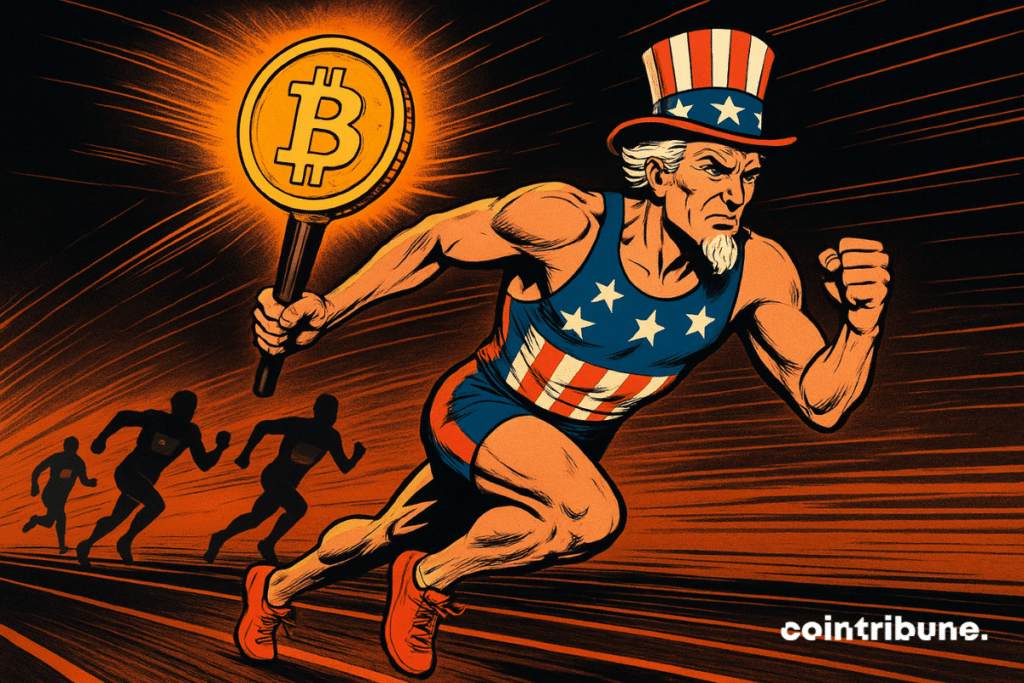The United States Goes All-In on Bitcoin
The United States and the presidential circle are all-in on bitcoin while Europe continues to fall behind.

In brief
- Two sons of Donald Trump launch the American Bitcoin miner.
- France remains absent despite its surplus nuclear electricity.
- Bitcoin, the future reserve currency of the United States.
The Trump family mines bitcoins
We know that the American president’s company, Trump Media & Technology Group, bought two billion dollars worth of bitcoins in July. But that’s not all. Two of the American president’s sons launched the American Bitcoin miner last March.
This is a subsidiary 80% owned by Hut 8, another American miner. A stock market listing is planned for September. Hut 8 has a computing power of 8.85 EH/s (exahashes per second), compared to 10 EH/s for American Bitcoin.
The company recently finalized the purchase of 16,299 Antminers S21 manufactured by Bitmain, for an amount of 314 million dollars. The financing plan indicates the intention to acquire an additional 15 EH/s, which would bring the total to 25 EH/s.
The group would then become the fourth largest American miner, behind Marathon (~50 EH/s), CleanSpark (~40 EH/s), Riot (~31 EH/s). Knowing that the global hashrate just reached 1 ZH/s, or 1,000 EH/s.
The United States controls about 35% of the global hashrate, compared to approximately 17% for Russia and 15% for China. Even better, the company Block has just launched machines rivaling those of the Chinese Bitmain. In other words, the country is largely sovereign on the matter.
There are signs that do not deceive. The American president’s interest in bitcoin is genuine and all this suggests that the United States will indeed make bitcoin their reserve currency.
Precisely the goal of Senator Cynthia Lummis and her “Bitcoin Act” bill. This proposes to sell part of the gold stocks to accumulate one million bitcoins.
Meanwhile, Europe remains absent, not even able to recognize that bitcoin is the missing link of the energy transition. It is truly disheartening.
Bitcoin can absorb surplus nuclear electricity
We have on the old continent the leaders of bitcoin wallets (Ledger, Trezor), but no large-scale miner. And yet, there would be plenty to do if the French and German green political parties really dug into the subject.
Indeed, balancing the electricity grid by demand is increasingly essential to accommodate at a lower cost the rise of intermittent energies and the headache they represent for grid managers.
Forcing nuclear power plants to constantly modulate their electricity production to compensate for wind intermittency is not sustainable. These sudden shutdowns damage them. What a waste, especially at a time when tens of billions are being sought to build six new reactors.
On the contrary, we should value our surplus electricity by mining bitcoins. This would preserve our energy heritage, while providing a significant financial boon to EDF which desperately needs it.
Bitcoin miners have the very practical advantage of offering a real-time load shedding solution to network operators who can then do without expensive “peak” power plants supposed to take over in emergencies.
This symbiosis between bitcoin miners and energy providers already exists in Texas. It works so well that the local grid operator (ERCOT) recently cancelled the construction of several gas power plants. Why? Because miners can return more than 3 GW to the grid instantly and without time limit.
Bitcoin, a geostrategic imperative
Beyond the services it can render to energy providers, stateless bitcoin is above all a reserve currency in the making.
No one has failed to notice that the BRICS, led by Russia and China, no longer want to finance American debt by placing their foreign exchange reserves there. This distrust is also not unrelated to what is happening in Ukraine…
The American debt of 37 trillion dollars worries the whole world. Americans live largely beyond their means. Result: the greenback has lost 40% of its purchasing power over the last ten years.
Sure, Treasury bonds pay interest, but not enough to offset inflation. Many central banks now prefer to place their reserves in gold while the dollar’s share continues to decline.
The world’s workshop, China, no longer wants the dollar. That’s why the strategy now is to reindustrialize to reduce the trade deficit. But becoming an exporting nation again requires a weak dollar, hence the American government’s interest in bitcoin.
The explanation is very simple. Washington will not accept the yuan replacing the dollar on the international stage. If the famous “exorbitant privilege” must be lost, let’s wager that Americans will turn to bitcoin, a stateless, uncensorable currency with a money supply limited to 21 million units.
Former White House advisor Bo Hines still thinks the United States will take action before the end of the year:
I remain very confident that the American government remains very favorable to the idea of acting quickly to accumulate bitcoins for its strategic reserve. I tell people to keep their eyes wide open. I am sure the news is coming.
Bo Hines
It is time for Europe to wake up and for the debate to move forward. This is the case in Brazil, Russia, the United Arab Emirates, Japan, South Korea, Taiwan, etc.
Don’t miss our article about the latest Bitwise report which also expects bitcoin to become a top choice reserve currency.
Maximize your Cointribune experience with our "Read to Earn" program! For every article you read, earn points and access exclusive rewards. Sign up now and start earning benefits.
Bitcoin, geopolitical, economic and energy journalist.
The views, thoughts, and opinions expressed in this article belong solely to the author, and should not be taken as investment advice. Do your own research before taking any investment decisions.